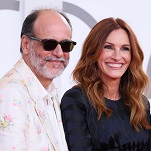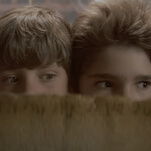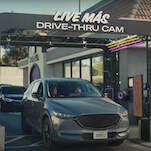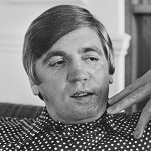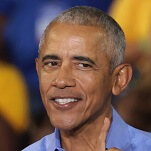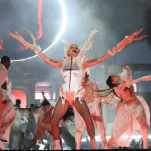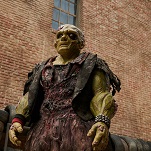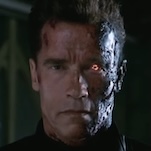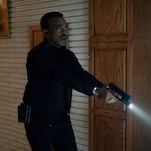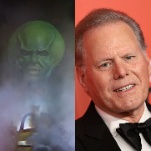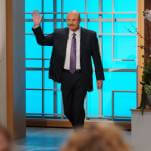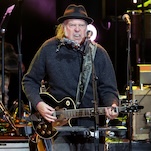Director: Jay Sheridan
Tagline: “With a guitar in his hand… a gal on his arm… and a talent for trouble in his fists… he battled his way from the backwoods to the big time the only way he knew how!”
Plot: Fresh out of a stint in the army, an aspiring country singer played by Waylon Jennings tries to make a go of it in the music business, only to encounter a den of liars, con men, snake-oil salesmen, and all-around no-goodniks. Most notable among them: Gordon Oas-Heim, a scheming entertainment lawyer/Udo Kier lookalike referred to by an underling as “a mean man with a horse” who treats his artists as roughly as he treats his luckless studs and fillies.
The professional parasite immediately sets about extricating Jennings’ do-gooder wife (future Newhart star Mary Frann) from the picture and corrupting Jennings’ fragile, delicate soul. Will Jennings make it to the big time with his integrity and marriage intact? And why, for the love of God, are so many of the characters out of frame when they deliver key lines? And just how many time-filling musical performances only tangentially related to the plot can one director shoehorn into one film?
Key Scenes: Immediately upon leaving the military, Jennings runs into trouble when a group of suspiciously non-threatening young men pick him up hitchhiking and give him the “Serviceman’s Special”: They force him to guzzle alcohol, beat him up, rob him, and leave him bloody and unconscious on the side of the road. This, needless to say, is good preparation for breaking into the music business
Ah, but Jennings is a man with a dream. As he stiffly informs Frann, “I would like to make my mark in life with music.” Who could resist such a man? Not the unmarried Frann, propriety be damned. Then, in the first of many irrelevant performances, a country-fried cut-up named Cousin Jody stops the film dead in its tracks for a minute and a half of manic mugging and hillbilly tomfoolery
If Jennings is unconvincing essentially playing himself, he’s even less convincing as a country Casanova, as evidenced by this scene where he poses awkwardly with Frann before the two lurch into bed together. At this point, Frann’s not-so-proud papa demands a shotgun wedding for the twosome, minus the shotgun.
The newly married man soon faces temptation in the form of Oas-Heim, a big-shot lawyer feeding him honey-dripping words about his imminent stardom. Jennings unearthed previously unimagined heights of woodenness in front of Nashville Rebel’s cameras. He was not alone. Everyone in the film seems to have forgotten how to behave like a musician, play an instrument, or act like a human being, as in this scene where Porter Wagoner invites special guests the Wilburn Brothers to introduce even more special guest Loretta Lynn.
After Frann leaves Jennings, friction begins to develop between Jennings and his manager, who decides to destroy him professionally after getting attacked by his protégé.
In retaliation, Oas-Heim sets Jennings up to fail by placing him in a snooty Chicago nightclub that might as well have a “No Hillbillies Allowed” sign on its front door. To literally add insult to injury, Oas-Heim has special guest star Henny Youngman roast Jennings with zingers like, “They want him to get out of the country and western field. I just want him to get out of the country.”
Then Jennings receives some bad news: He’s finished! The manager destroys Jennings’ fragile ego by tricking him into thinking he’d paid audiences to like him. Yes, even the entire Grand Ole Opry. Apparently, Oas-Heim has deep, deep pockets and Jennings is gullible to the point of being mentally challenged. Alas, the manager fails to pass along even worse news: Frann is sick and pregnant! What’s a Nashville rebel to do but drown his sorrows in a bottle?
Just before he goes onstage for his big comeback performance at the Grand Ole Opry, Jennings finally receives some long overdue bad news, delivered with a minimum of tact. Thankfully, redemption lies just around the corner when he issues a heartfelt declaration of love to his sickly wife over the radio and they’re joyously reunited. And Frann’s all better! And the announcer at the Grand Ole Opry inexplicably knows this all and broadcasts it on the radio! Everything is going to be perfect forever!
Can easily be distinguished by: Its singular combination of transcendent country music and painfully amateur filmmaking, as well as the surreal juxtaposition of performers as disparate as Tex Ritter, Youngman, Jennings, and Lynn. It’s also so shamelessly sentimental that it boasts not one but two maudlin ditties imagining a country heaven populated by the likes of Hank Williams, Patsy Cline, and their late, lamented peers. And 2Pac, for some reason. (That dude is everywhere.)
Sign that it was made in 1966: Considering Jennings’ later fame as a shaggy-haired rebel, it’s a little jarring seeing him freshly shaven, squeaky clean, and sporting a Brylcreem-slicked pompadour. Nashville Rebel captures the likes of Jennings and Lynn before they became too big to appear in cornball hicksploitation melodramas and very clumsily anticipates Jennings’ actual musical rebellion of the early and mid-’70s. It unwittingly captures a changing of the guard as old-timers like Tex Ritter gave way to younger performers. Today, it’s most useful as a sociological document of what Nashville looked like in the late ’60s, before Jennings and Willie Nelson changed the genre forever and broke it permanently into the mainstream of American life.
Timeless message: Never compromise your creative vision by, say, allowing your handlers to convince you to appear in a cheeseball show-business melodrama written, directed, and acted by rank amateurs. Oh, and don’t hire a manager who behaves like Satan’s asshole younger brother.
Memorable Quotes: Nashville Rebel is never afraid to spell out its themes in capital letters, as when the promoter tells his naïve young protégé, “I happen to believe you’re a walking, talking goldmine” or when Oas-Heim’s elegant sidekick says of Jennings’ wardrobe, “Miss Grove, Arlin might look alright behind a gas pump, but they’ll laugh him right off the stage in that hillbilly outfit.”


